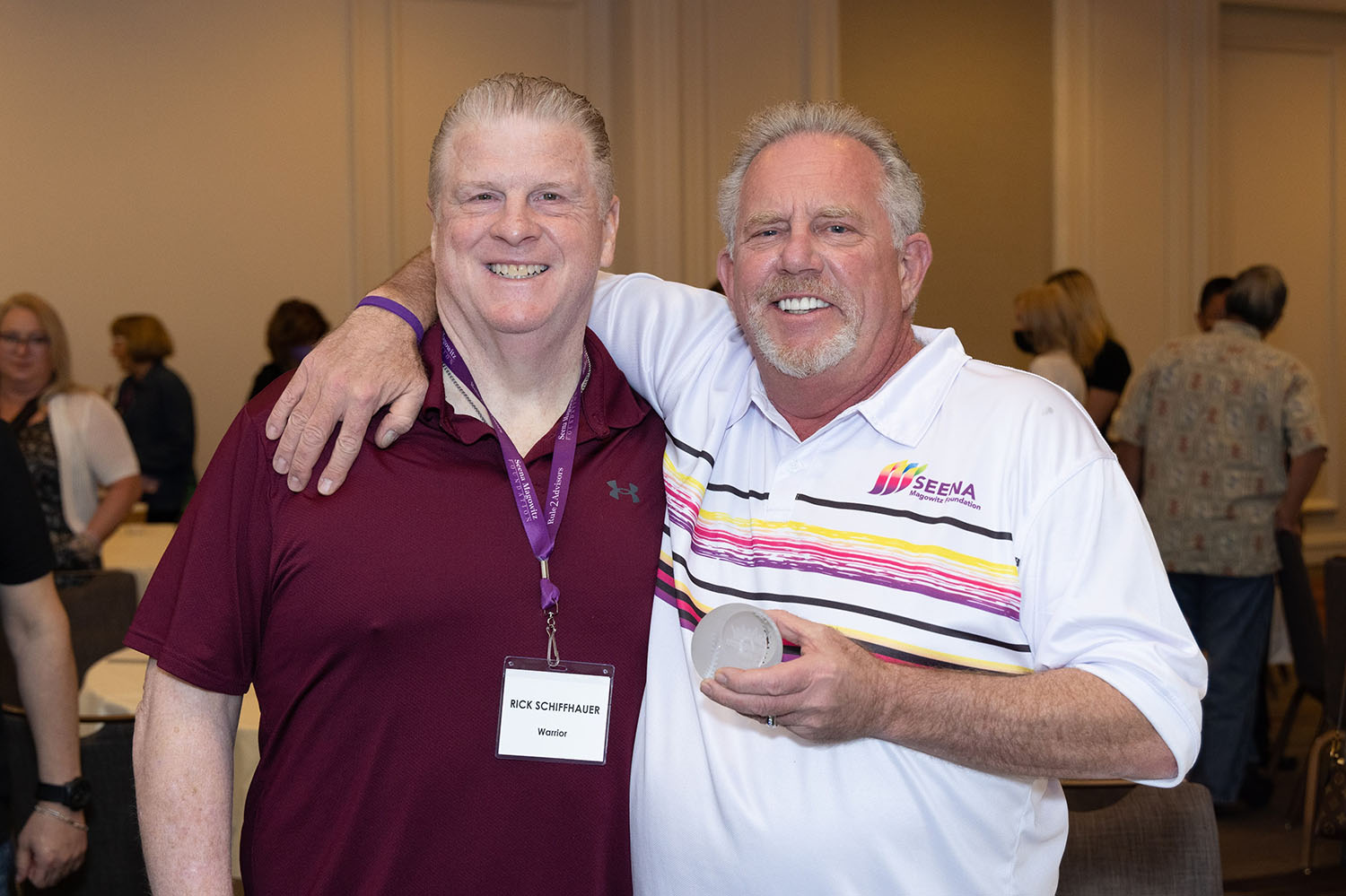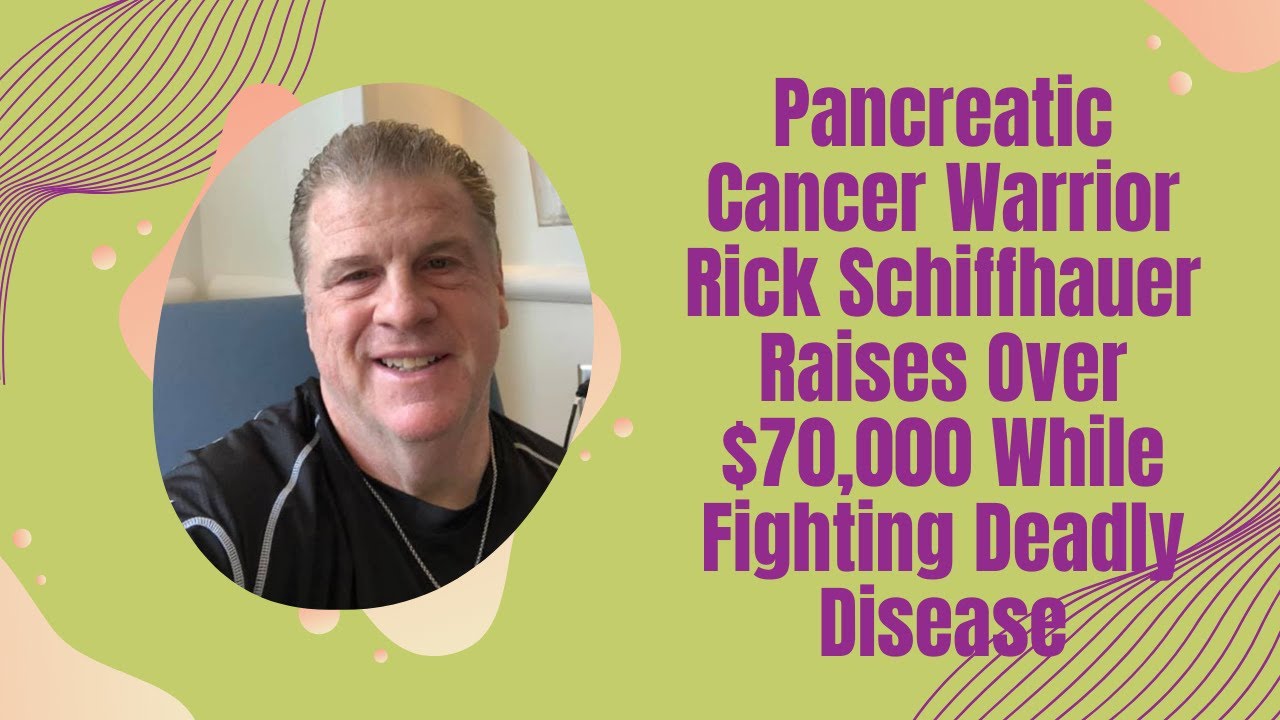
Rick Schiffhauer Earned His Wings in July, 2023
He Lost The Battle To Pancreatic Cancer.
Following Was His Original Warrior Story
Playing Hardball: How Stage 4 Patient Rick Schiffhauer Scored $75,000 for Pancreatic Cancer Research
Written By Julia Brabant
May 2021
Date of Diagnosis: Sept. 5, 2020
May 2021 Status: No evidence of active cancer
When life threw Rick Schiffhauer a major curveball, he did more than step up to the plate – he went to bat for the more than 60,000 patients who receive pancreatic cancer diagnoses each year in America.
Rick, a native of Rochester, New York, and the President of Smash It Sports, a top-rated retailer of baseball and softball bats, sports apparel and other athletic equipment, first knew something was up after falling ill at work in August of 2020. He went home and crawled under a pile of blankets while his wife urged him to go to the hospital.
He waited a day before heading there, but when his symptoms didn’t improve, he took her advice and went to urgent care. There, doctors told him his bilirubin levels were sky-high and that they thought he might have gallstones. They did note a lesion on his pancreas, but they said it shouldn’t be anything to worry about.
Once doctors believed he’d passed the gallstone, Rick returned home. The fatigue returned soon after, and, again, at his wife, Karen’s urging, he went to the local emergency room. There, doctors spotted something pushing against his bile duct and conducted a biopsy. When biopsy results looked normal, doctors suspected they were inaccurate and wound up conducting two additional biopsies within the same one-month span.
By September 5 of 2021 Rick’s doctor called with sobering news.
“You’ve got cancer,” he said, prompting Rick to drop the phone. Things moved quickly in the days that followed. Rick met with two surgeons and put plans in place to undergo the Whipple procedure, which is a highly complex surgery that requires removing the head of the pancreas, part of the small intestine, the gallbladder and the bile duct.
Scheduled to have the invasive procedure on a Monday, Rick, a lifelong softball fan, player and coach, told doctors he had to be back on the diamond by Saturday to coach his daughter’s team. Saturday was also Halloween, and he had no intention of letting something like the Whipple sideline him from spending the day within his family.
He moved forward with the surgery, but when he came to after the procedure, he wasn’t on the road to recovery:
He asked his doctors what this latest development meant for his prognosis. The doctor told him the average patient in his shoes had about a year to live.
“That was a bit of a turning point for me. I found myself thinking, ‘You know, I’ve never been average,’” Rick said. “And I’m not about to start now.”
Sharing this sentiment with his doctor, he felt the mood shift in the room. The doctor too, seemed to gain confidence from Rick’s change in mindset, and they decided to start Rick on an aggressive chemotherapy regimen using FOLFIRINOX.
There, he met with Dr. Daniel Von Hoff, M.D., a global leader in pancreatic cancer research and treatment.
“He sat there for over an hour,” Rick said, of their initial meeting. “I was blown away by the amount of time he spent with me.”
While Rick, his wife, his five children, and three grandchildren are optimistic and hopeful the worst is behind them, Rick felt compelled to do more in the fight against the disease. In the days, weeks, and months that followed his own diagnosis, he spearheaded efforts that brought in more than $75,000 for the Seena Magowitz Foundation. The nonprofit will use the funds to finance new pancreatic cancer clinical trials.
To raise money and awareness, Rick first reached out to his considerable social media following, sharing anecdotes about his own treatments and struggles. He then leveraged connections he had in the sports world, partnering with the likes of Easton Official to produce a special-edition “Schiffhauer Strong” baseball bat, with 100% of proceeds generated from sales supporting the Seena Magowitz Foundation.
“You see a bit of a hole in our system when you have pancreatic cancer – there’s not always someone to turn to,” Rick said, noting that many pancreatic cancer patients are older and may lack the technical skills needed to make connections online. “It would be nice if there was a more centralized source of support out there for patients.”
Rick is happy to serve as that source of support for anyone who needs it.
“I’m a strong believer in God’s plan,” he said. “I always felt there was something in my future that was going to give me a way to help a lot of people, and this has to be it.”
He admits his outlook hasn’t always been so rosy. “When I was first diagnosed, every time I woke up, cancer was on my mind,” he said. “I’m not that way anymore.”
Rick credits optimism with helping him maintain a positive mindset – and he also gives some of the praise to his high school football coach, who taught him a valuable lesson he had no idea how much he’d need one day.
“You’re the only guy who won’t quit playing hard,” his coach said.
Rick’s close friend and colleague, Don Cooper, also helped Rick focus his attention where it mattered.
“I’d said to Don – every time my little girls walk by, I just want to cry, thinking about what could happen in the future,” Rick said. “I asked him – what would you do in my shoes?”
Don thought about it for a moment before responding. “I think, every time I looked at them, I’d remember my reasons to fight.”
That’s exactly what Rick has done in the days since. He continues to keep his eye on the future, and his most recent scans, taken in May of 2021, showed no signs of active cancer.
While Rick continues to raise both money and awareness for the fight against pancreatic cancer, he now has a fresh goal in mind: seeing his 10- and 11-year-old girls play high school softball.
Editor’s Note:
Rick welcomes donations to his personal fundraising campaign no matter how small the donations
100% of donations are allocated to clinical trials and awareness that will help save and extend lives.
Click here to make a donation. Leave a comment. We love to recognize all donators.



Wishes coming your way